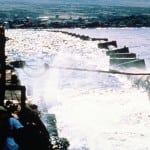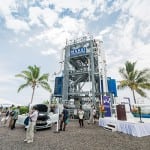Renewable and reliable alternative energy is a critical need as the world’s oil supplies are depleted. Using its globally renowned expertise in engineering and systems integration, Lockheed Martin is successfully pioneering new ways to leverage solar, wind, and wave energy as alternatives to fossil fuels.
One project, Ocean Thermal Energy Conversion, or OTEC, leverages the temperature difference between surface water and deeper ocean troughs in tropical and sub-tropical oceans. Though the fundamental technology behind OTEC is proven, the use of OTEC on a large, utility scale, as an economically viable option, must still be demonstrated. Lockheed Martin hopes to prove the viability of an OTEC system at utility scale in the next few years.
In geographical areas with warm surface water and cold deep water, the temperature difference can be leveraged to drive a steam cycle that turns a turbine and produces power. Warm surface sea water passes through a heat exchanger, vaporizing a low boiling point working fluid to drive a turbine generator, producing electricity. The vapor is condensed back to liquid after passing through a second heat exchanger that connects with large amounts of cold ocean water pumped from deep below the surface. There is no supplemental storage of the power required and practically zero carbon emissions. Critical advances in the technologies related to the system’s cold water pipe and heat exchanges will allow OTEC to serve as an economically viable energy source.
OTEC can also be used to produce energy carriers such as hydrogen and ammonia, which can be shipped to areas that are not close to ocean thermal energy resources. Additionally, OTEC systems can be augmented to produce fresh water.
Lockheed Martin first began exploring the technology associated with OTEC in the mid 1970s, when a conceptual design was studied, funded by the National Science Foundation. Following the study, Lockheed Martin demonstrated the technology with the construction and operation of what is known as “Mini-OTEC” in Hawaii. Mini-OTEC remains the world’s only successful floating ocean thermal energy system, generating continuous net power over the three-month test period.
The potential for OTEC to support a range of global energy and water-supply requirements is within reach. Lockheed Martin and its partners are working on the design for a small commercial-sized OTEC plant. A “pilot” plant, which would be built first, could be customized to provide the engineering and operations team all of the additional insight and access required to monitor and understand the plant’s operations. Based on the lessons learned from that incremental step, the team will make commercial utility-scaled plants a reality.
Lockheed Martin, a global security company, is working with its government and utility customers to address energy and climate challenges in the areas of energy efficiency, energy management and security, alternative power generation, and climate monitoring.











